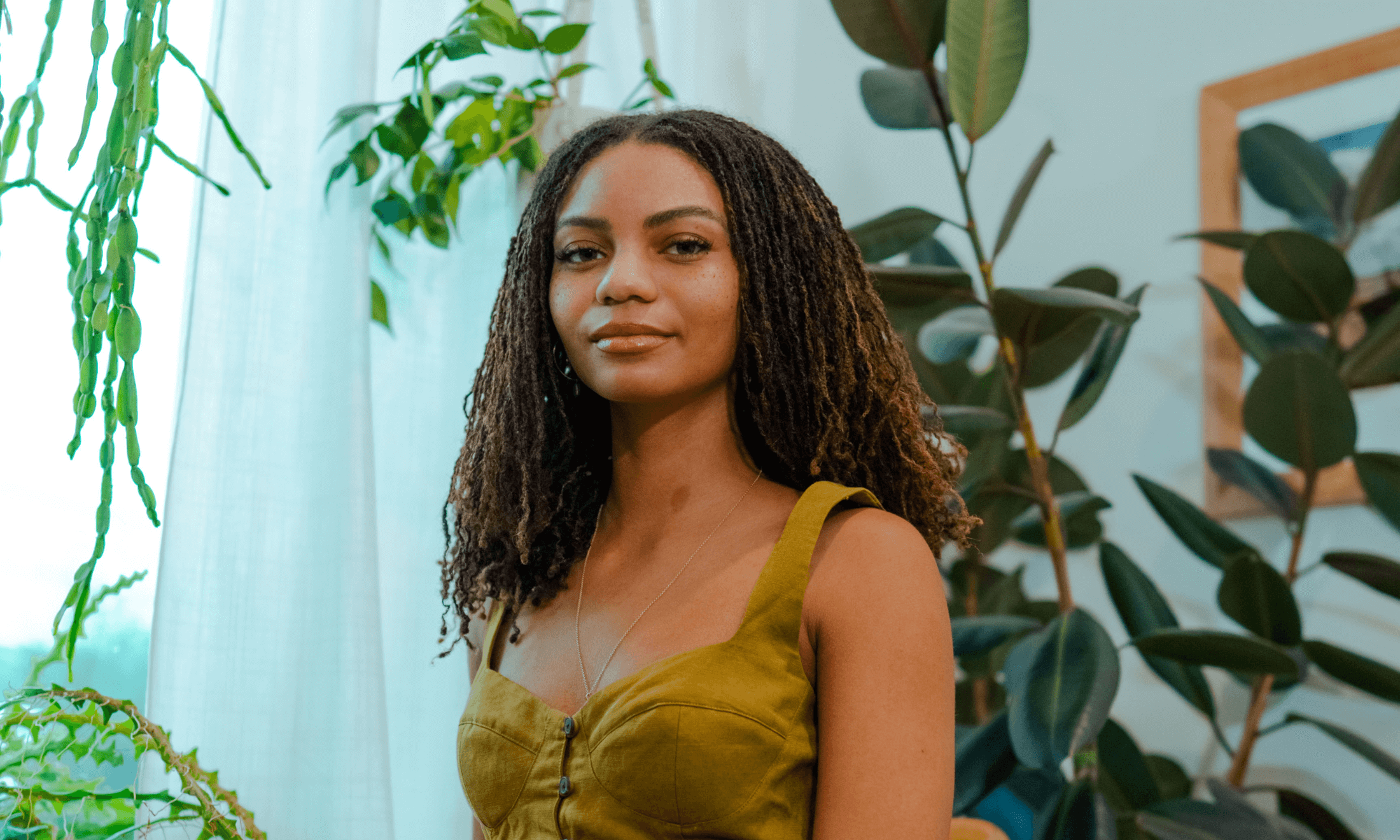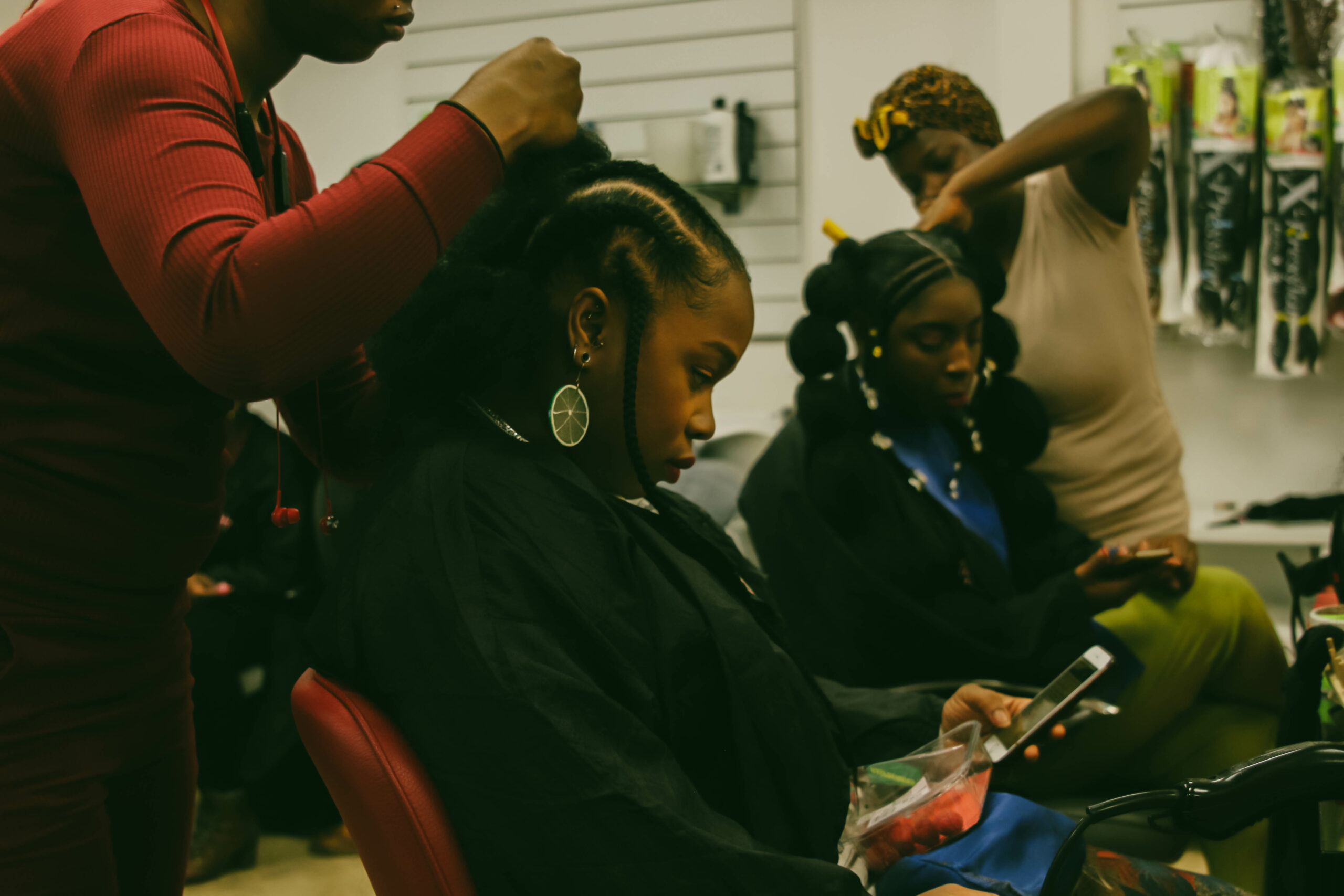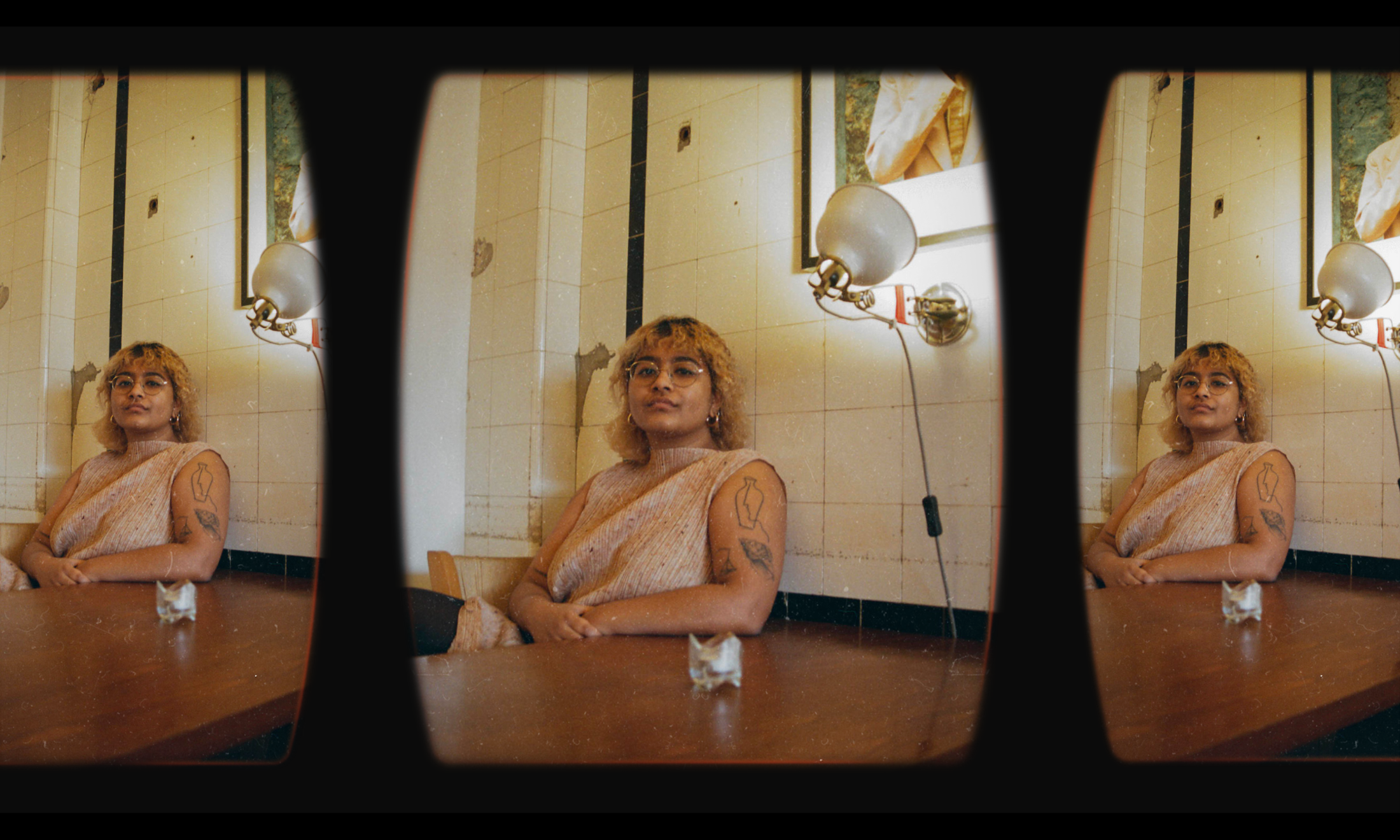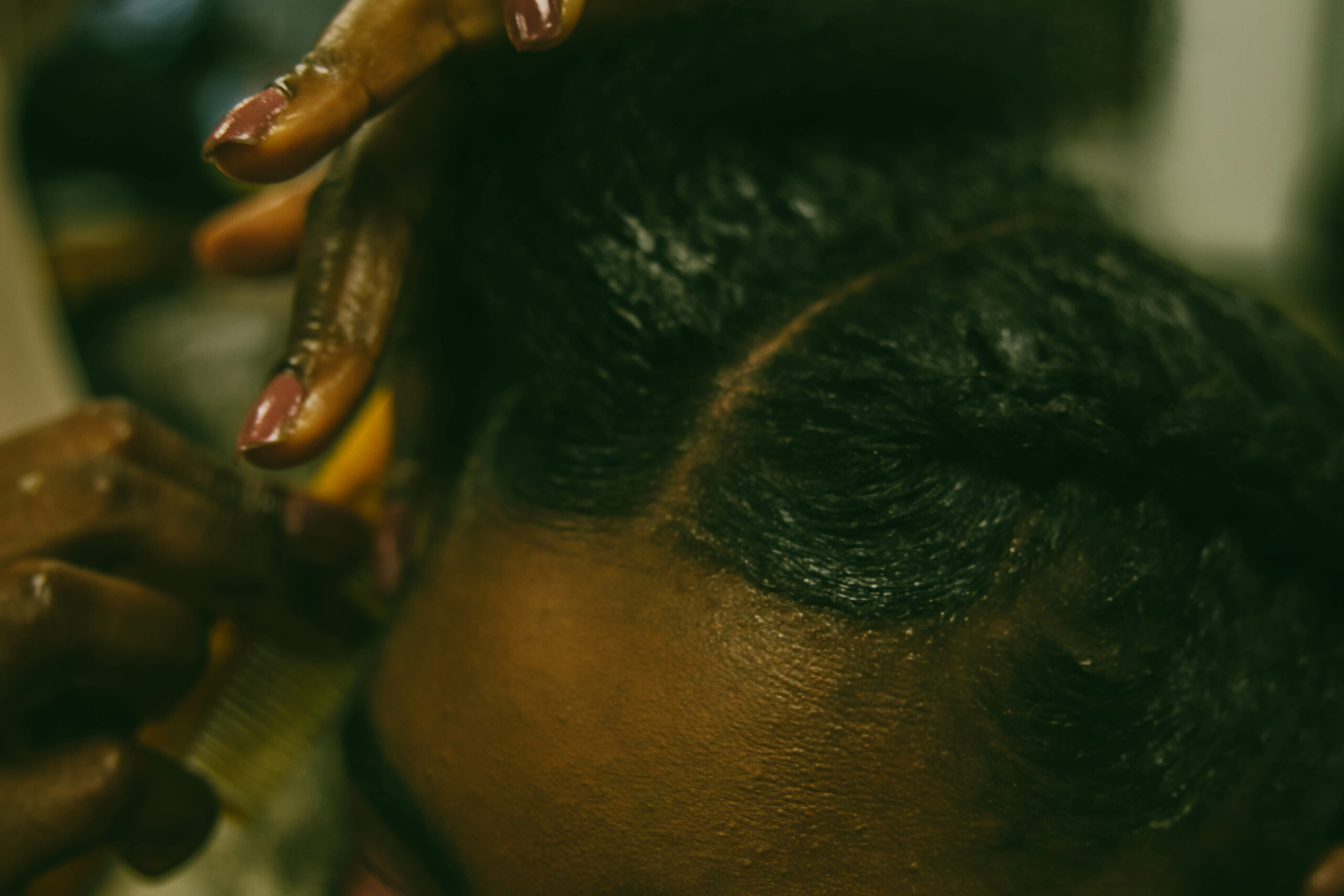
Jessica Eliza Ross
A Quick Ting on The Black Girl Afro is the book we’ve been waiting for on Black hair experiences
gal-dem's Afro Answers columnist Ebuni Ajiduah sits down with author Zainab Kwaw-Swanzy to talk through haircare journeys, routines and experiences.
Ebuni Ajiduah
12 Apr 2022
When you think of Black British girlhood experiences, what comes to mind? Is it gelling your baby hairs before school or adorning your bun with laces, dice or chupa chups? Your first relaxer and the pain of holding on for five more minutes so it takes? Or perhaps seeing the first Black hair advert on TV or on a billboard?
Zainab Kwaw-Swanzy perfectly captures the multitudes of experiences Black women and girls go through with their hair in her debut book The Black Girl Afro, the second instalment in the A Quick Ting On series. You could be deceived by its size, but her book showcases the richness and struggles faced by Black women in the UK. Filled with stories and interviews and my personal favourite section, debunking hair myths, Zainab takes us on a journey that twists and turns just like our hair. It archives our experiences and would be fitting for a time capsule waiting to be discovered by future generations.
“Her debut covers the sometimes political, highly nuanced and glorious journey of being a Black woman with Afro hair in the UK”
I had the chance to speak to Zainab on a rare sunny afternoon in London for her first solo interview for The Black Girl Afro. As we chatted over Zoom she was perched in front of a bookcase with her book taking centre stage. The bright cover of purple, yellow and three gorgeous Black women, illustrated by Camilla Ru, draws you in and the text inside will keep you turning.
Full of personal musings and expert input, her debut covers the sometimes political, highly nuanced and glorious journey of being a Black woman with Afro hair in the UK. And after the whirlwind writing, editing process all while still working during a pandemic (she’s also a model, mathematician and product manager) it was her first real chance to look back and reflect on the journey so far.
gal-dem: looking at your previous work – awards, model, mathematician, product manager working in banking. Where do you find the time to write a book between being an award-winning everything?
Zainab : Oh, God so cringy. This is the golden question. Generally, I am at my best when I am doing a few things. Even at school, I loved to have hobbies outside of my studies. Mags asked me if I wanted to do this, I thought, actually, I haven’t done anything new. I have a lot going on but this really felt like a new challenge. It’s so rare that you get to come across a new adventure like that. I couldn’t say no.
Lockdown really allowed me to own my time. This year, I’ve been a lot more intentional about what I’m spending time on. As I get older, I don’t want every year to be hustling and being like you’re burning out. I want to be a bit smarter about that going forward. It’s something I’m still working on.
You said that Mags (Magdalene Abraha), the founder of A Quick Ting On series, came to you and asked if you’d like to write a book, did she just come and put a book deal in your lap? Was writing a book something you wanted to do?
Zainab: That’s what I said! She literally approached me in a WhatsApp message. I initially said, No, I don’t. She explained her idea for the series so I thought, why not? It was never my dream to write a book because I never thought I would get that opportunity, if I would write about anything, it would be this. I’ve done a lot of public speaking around diversity and inclusion, but I have often spoken about my experiences with natural hair and Afro hair, particularly in the workplace because I work in a corporate industry. I’ve gotten more and more into writing over the years so that’s how Mags came across me. [She] really wanted everyone to be a first-time author. That was a bonus with this series where it’s really about platforming voices that wouldn’t always be able to get a book deal that easily.
How do you find your relationship with your hair in the workplace? Did you ever feel any pressure to change or fit a certain mold?
Zainab: At the start of my career, I had that challenge. When you’re in that environment, you have to go buy a suit, you have to look professional, all of these words that feel like nothing, but they’re actually really loaded. I talk about this in the book, what does it mean to be professional? A lot of the time that is rooted in discriminatory ideals. When I was applying for the job I was very conscious there were not many Black people in this space. I wanted to fit in, it meant that I straightened my hair. I didn’t face outright discrimination, it was more I was trying to do things to minimise myself. Then I found a team where I felt they were really open and embraced diversity.
You’re a model extraordinaire too, and you walked Fashion Week this year. What was your experience of hairstyling behind the scenes, preparing for shoots?
Zainab: I’ve been signed for just under a year, but I have done modelling jobs before that. The good thing about some of the modelling jobs I’ve got so far is the campaigns and shoots where it is about Black women or Afro hair products. They get the right people on set, because that’s the whole point of the campaign.
Years ago, so this is when I wasn’t signed, I got to a shoot and it was me, an Asian model and a white model. I was the only one who asked ‘is your head dirty?’ And I was like ‘no’. She [the hair stylist] was sort of feeling my hair, she was very cautious. I felt like she was disgusted so that was not a nice experience. I’m a bit more cautious about who will be styling my hair and this last fashion week actually I did message the hairstylist before to say ‘is there anything I need’ and she was really accommodating.
Let’s talk about the book. It was very comprehensive, there’s a quote “Black women are taught that their hair’s either permanently or intrinsically good or bad…it means that you have young black girls growing up to believe they have permanently undesirable hair.” Was that something you could relate to?
Zainab: I had a few experiences when I was younger, it always felt like my hair was quite tough to handle. I never really went to the salon lot, but I remember going a couple of times. But I remember feeling like, ‘oh gosh, sorry’, to the hairstylist, ‘I’m sorry, you’re gonna have to deal with this hair.’ And it’s something that’s been around forever, this idea that natural hair is just generally difficult to handle. I’ve been unlearning this over a number of years. Your hair is just your hair, I always say this in the book. It’s not just hair, but my hope is that it does become just hair.
What for you personally is your biggest takeaway from this whole experience?
Zainab: The book has meant a lot of things. There are a lot of things I’m passionate about, but it all trickles down to a couple of very key passions. One thing: using my platform to empower or champion others. But for me, the book and I guess the whole A Quick Ting On series, is the thing I needed when I was younger.
“It is okay to tell people not to touch your hair”
What would you say to a younger Zainab, about her hair that you know now?
Zainab: For primary school Zainab, who really wanted straight hair like all the cartoons or the Disney Princesses, for her I would say, your hair is so fine as is. Even when you come home from school and it’s just all scraggly, that is your hair. And that is fine. You’re fine as you are. Just keep enjoying life. Side note, I’ve got a nine-month-old niece, she has a full Afro and we’re going to tell you all the time how lovely this hair is.
For a secondary school, Zainab, don’t compare yourself to others. Again, you’re doing fine anyway, specifically, from a hair point of view, you don’t need to do anything to fit in. You don’t change yourself. You should be shouting at people to not touch your hair, tell people No. It is okay to tell people not to touch your hair. You didn’t do that enough. You started to but not enough. For Uni Zainab, don’t worry that you’re the only Black person on your course.
It wouldn’t be right if we didn’t end with some fun quick-fire hair related questions. What’s your favourite hair product at the moment?
Zainab: I would say the Afrocenchix moisturising hairspray.
Pree poo or no poo?
Zainab: Pree poo
Washing sections or just all in one?
Zainab: This hair!? Wash in sections
Wash’n’go or twist out?
Zainab: Twist out
Heat or no heat?
Zainab: No heat
Headscarf or bonnet?
Zainab: Oooh bonnet, but actually satin pillowcase overall
DIY or Store-bought
Zainab: Store-bought, but black-owned
Twists or Plaits?
Zainab: Plaits
Sleek bun or afro puff?
Zainab: Oh, I’m gonna have to say Afro puff
Baby hair or no baby hair?
Zainab: no baby hairs sorry. Edges are just too much hassle for me!
A Quick Ting On The Black Girl Afro by Zainab Kwaw-Swanzy will be published on 14 April and is available for purchase here.
Like what you’re reading? Our groundbreaking journalism relies on the crucial support of a community of gal-dem members. We would not be able to continue to hold truth to power in this industry without them, and you can support us from £5 per month – less than a weekly coffee.
Our members get exclusive access to events, discounts from independent brands, newsletters from our editors, quarterly gifts, print magazines, and so much more!









